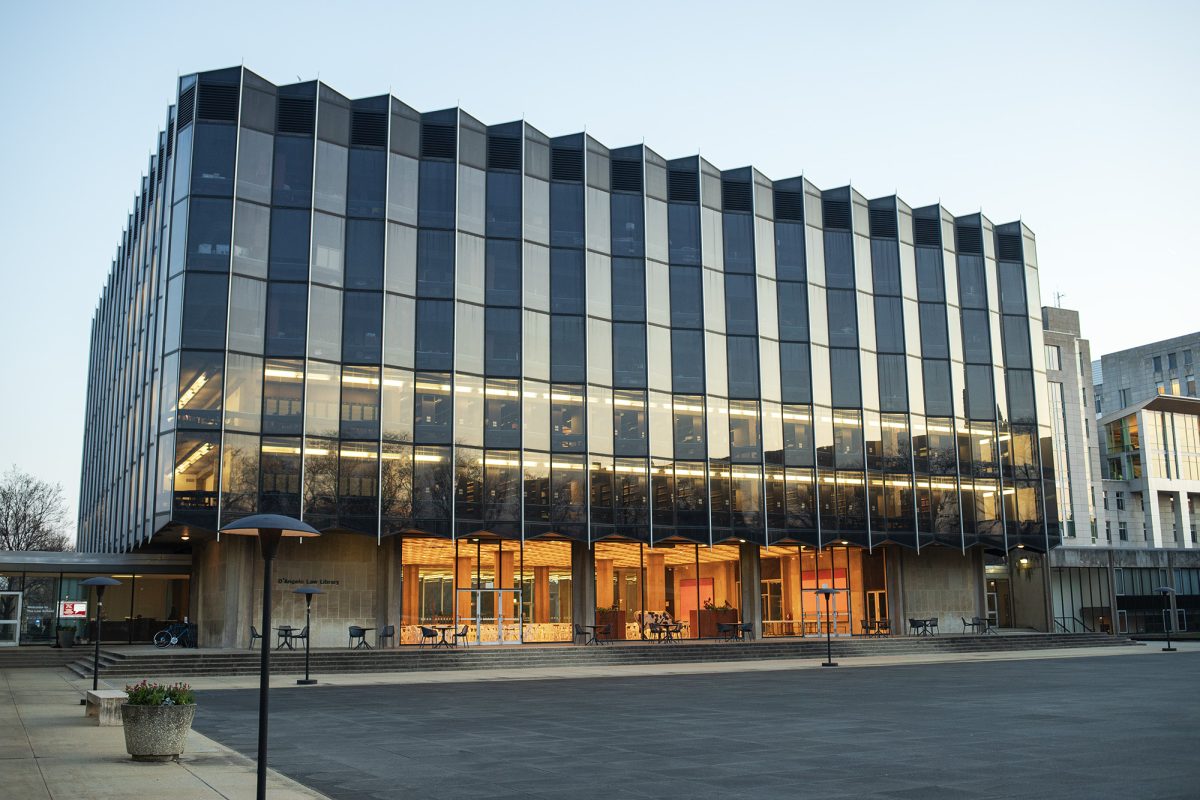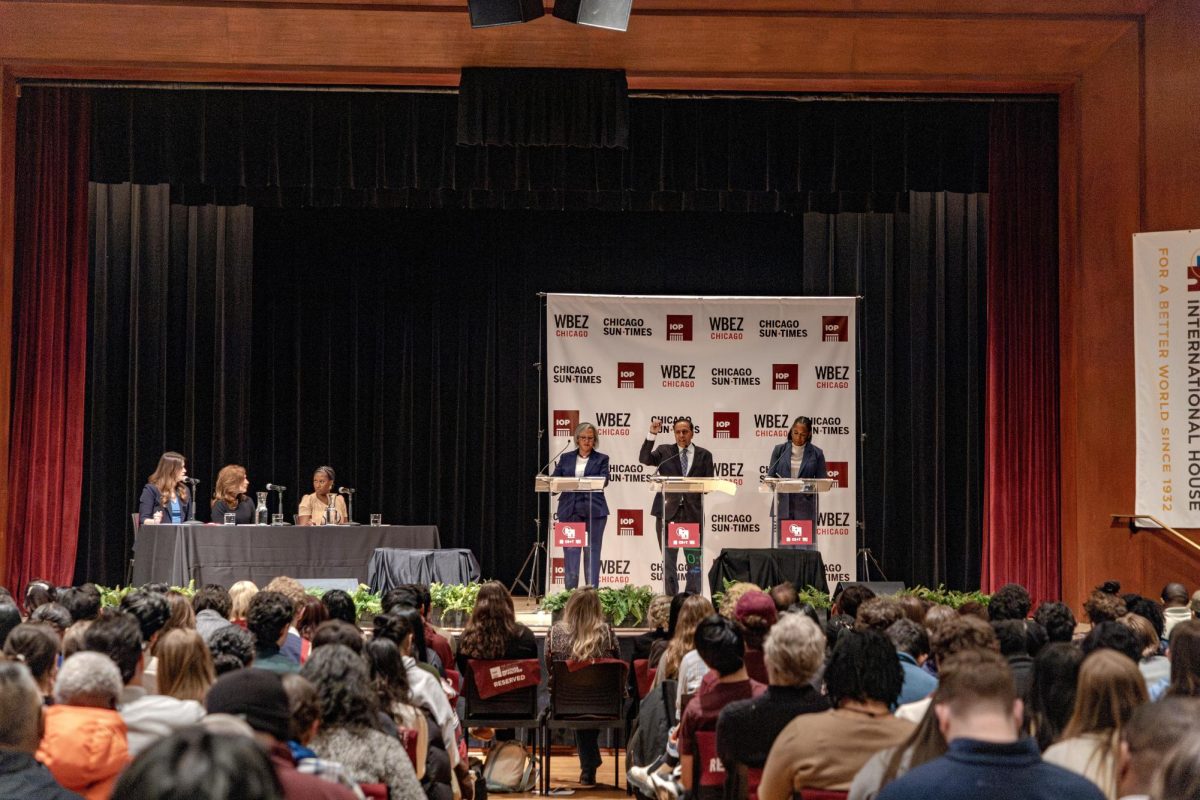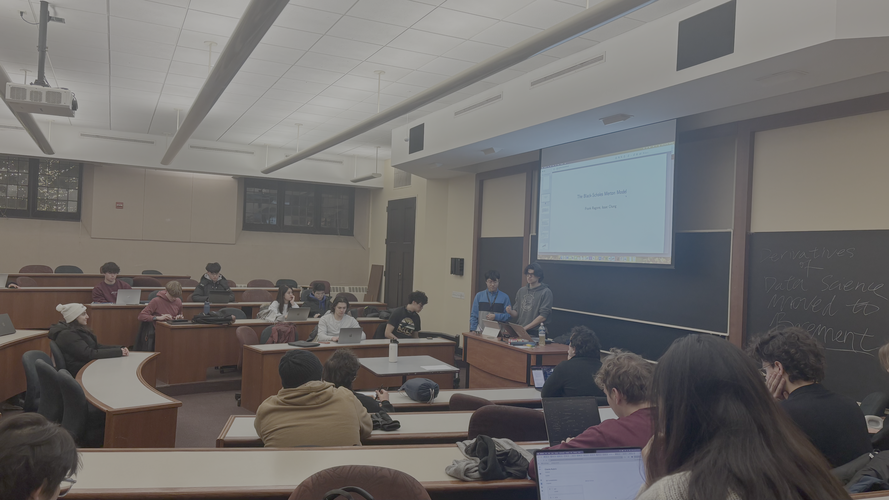Since President Donald Trump took office in January, his administration has enacted a deportation program targeting undocumented immigrants and legal residents alike. Hundreds of international students at schools including UChicago have had their visas revoked, often without explanation.
In some cases, the administration has labeled participation in pro-Palestine activism a threat to national security, allowing federal law enforcement to apprehend and detain even those with legal status who have not been accused of a crime.
To understand the rapidly shifting immigration landscape, the Maroon sat down with Nicole Hallett, a University of Chicago Law School clinical law professor and the director of the Immigrants’ Rights Clinic, which provides legal representation and advice to noncitizens.
Hallett discussed the Trump administration’s mass deportation program, the rights of noncitizens, and how the administration’s efforts may cause conflict with the Supreme Court.
Note: This interview has been edited for clarity and brevity.
Chicago Maroon: What work does your clinic do under normal circumstances, and how has that changed under the second Trump administration?
Nicole Hallett: There’s lots of immigration work to do under any administration, including the Trump administration; my clinic represents immigrants in a variety of proceedings before the government. Sometimes we represent people whom the government is trying to deport. Other times, we’re representing people who are applying for humanitarian benefits with the government—for example, asylum or relief for victims of human trafficking or domestic violence. But we essentially will represent anyone—any noncitizen—in any matter related to their immigration status in the United States.
CM: How has that work changed or increased since the beginning of the second Trump administration?
NH: I don’t think [our work] has changed. In some ways it hasn’t changed. It hasn’t changed in that the government continues to arrest people [and] continues to detain people.
I would say that the kinds of people who are being caught up in immigration enforcement have changed under Trump. So, it used to be, for instance, that maybe I would talk to a student who had an immigration issue once every year or two. Now I have students in my office every day asking questions because their visa has been revoked or because they’re worried that it’s going to be [revoked].
Under normal circumstances, the people who are really at risk of deportation are people who’ve been convicted of serious crimes and people who are undocumented. Now, it seems like the [Trump] administration is going after everyone, and so the kinds of people that end up in my office are a much broader group.
CM: What rights and protections do noncitizens in the United States have? And then, more specifically, what rights do students and faculty members at this University who are in the United States on visas or [who] have lawful permanent residency have?
NH: All noncitizens have the right to due process if they’re inside the United States, and so the government cannot simply deport someone without allowing them to fight their case, usually in immigration court. That can take weeks, it can take months, [or] it can sometimes take years.
However, even though all noncitizens have the right to due process, that doesn’t necessarily mean that they’re going to have very many good ways to fight their deportation. Specifically for people on non-immigrant visas—so that’s people who are on student visas, as well as people on temporary work visas, which includes many people who are in faculty roles—those people can have their visa[s] revoked, and the statute gives the government very broad authority to do that.
CM: Which statute gives the government that right?
NH: The Immigration and Nationality Act (INA) is the statute that controls basically everything related to immigration—both who we admit to the country and who’s allowed to remain and under what conditions. And the government in this area and the area of immigration has always had very, very broad authority.
Courts have traditionally given the government very wide discretion in terms of who is allowed to enter the United States and who is allowed to remain and under what conditions. Traditionally, this was because immigration was seen as an outgrowth of the executive branch’s authority over foreign affairs and Congress’s control over naturalization [as specified] in the Constitution. So, there has been, historically, very little judicial review over the laws that Congress passes and then that the executive [branch] uses to either prevent people from entering [or deport] people.
Right now, [the Trump administration seems] to be revoking visas for very specific reasons that might not be permitted. They seem to be revoking people’s visas based on their speech or their protest activity. We really haven’t seen that much in the last few decades in the United States, and I think the courts are going to have to consider whether the government has the right to do that, but the statute does give them broad authority to cancel visas, and so people should just be aware of that. Even though they can contest their deportation and immigration court, the government has broad authority in this area.
CM: Recently, the Supreme Court has taken a little bit more of an active role in some of the higher profile cases. The New York Times reported that the president of El Salvador said he would not return an individual who was deported from the United States that the Supreme Court ordered the U.S. government to return. What is that setting up? Is there recourse beyond that, and what is ultimately going to happen in that case?
NH: The Supreme Court did order the [U.S.] government to facilitate his return, and I think the Supreme Court was hoping that the administration would make a good faith effort to do so.
It seems very clear at this point that they have no intention of making any effort at all, and so this issue will almost certainly go back to the Supreme Court, and it’s being set up to be a conflict between the judiciary and the executive branch and potentially the first time in this administration that we’ve seen them directly flout a court order.
That remains to be seen, and it also remains to be seen how far the Supreme Court is willing to go to try to get the administration to comply, or whether they will back down in the face of the intransigence that they’re seeing from the administration. Now, I don’t have a crystal ball, so I don’t know how the Supreme Court is going to rule. But I think that this is really being set up as a test case for the administration in terms of how much they have to listen to [the] courts and how much they can assert their own prerogatives in the area of immigration.
CM: What would the Supreme Court asserting itself in the realm of immigration look like? What recourse do they have to essentially force the executive branch to take an action that [the courts have] ordered?
NH: In the previous order, the Supreme Court was very deferential, and it allowed the executive to determine the steps that it needed to take in order to bring Mr. Garcia back to the United States. The government has refused to take any steps, and so I think that the Supreme Court could order the administration to take more specific steps.
If the [Trump] administration then were not to comply with the order to take specific steps, the district court could hold government officials in contempt. That could include fines, it could include jail time, and we haven’t really seen a court go that far yet. They haven’t been required to.
But I think it’s also equally as likely that the Supreme Court will throw up its hands and say, “Well, we asked them to do what they could. They’ve told us they could do nothing, and so therefore they’ve complied with the order.”
I don’t know how it’s going to come out, but I think if the Supreme Court gives the government that power, they are going to use it broadly. They’re not just going to use it against [noncitizens]. We heard [on April 14] from President Trump in the Oval Office [that] he intends to send U.S. citizens to this mega prison in El Salvador. And so I think this would be the first of many situations in which the administration believes that it is above the law and acts accordingly.
CM: Some of the higher profile deportation efforts, specifically of people like [Columbia University graduate and pro-Palestine activist] Mahmoud Khalil, have been justified under a provision of the INA. Can you explain that provision and how it’s being used specifically to target the political speech of noncitizens?
NH: It’s a provision in the INA that allows the secretary of state to declare that a person’s presence in the United States is a risk to the foreign policy interests of the United States, and then, if the secretary of state makes that determination, it renders that person deportable.
The statute gives the secretary of state broad discretion to make those determinations. This statute was originally enacted during the Red Scare of the 1950s, [and] it has essentially not been used since then. It remains to be seen whether the federal courts—where this will eventually get litigated—are going to allow the administration to invoke it, when really what we’re talking about is protected speech. But the text of the statute itself is very broad and is intended to be used exactly the way that the administration is using it, although not necessarily in this particular context.
CM: How does the federal government’s current program of revoking student visas differ from the way that it has revoked visas in the past?
NH: The government could always revoke visas. Oftentimes that would occur when someone was convicted of a serious crime or there were other national security concerns that arose. That authority was usually not used to handle minor infractions.
What the government is doing right now, my understanding is that they’re comparing a list of students and faculty who are on temporary visas with law enforcement databases, and if there’s any hit at all, those visas are revoked almost automatically. That can mean something as minor as a traffic ticket [or] being arrested and then immediately released and no charges being filed. You know, very, very minor things.
You might wonder, why is the administration doing this? I think there’s a couple of reasons. The first is that I think the administration is trying to form a culture of fear on U.S. campuses and universities. They want noncitizens to be afraid to speak out, to protest, and to do anything that will get them in the crosshairs of the administration. And so I think they’re really succeeding at that. I talk to people every day that are terrified that their visa is going to get revoked. I think that is an explicit goal of the policy.
The other reason I think the administration is doing this is that they have promised that they would deport a million people in the first year of Trump’s second term, and they are not nearly on track for that. It turns out that it is very difficult to deport people; particularly if you’re talking about undocumented immigrants, it’s very difficult to locate them. They usually are living in the shadows, and so [the administration looks at] these students who they have… addresses [for]. They know where they live, and they know that [these students are] much less likely to contest their deportation and more likely to simply go home if their visa is revoked.
[The students are] sort of acting like low-hanging fruit. [The Trump administration] can get their numbers up, and they can make it seem like they’re being very tough, even though the number of [deported] “serious criminals” or undocumented immigrants remains fairly steady from previous administrations.
CM: For people who have their visas revoked—who are informed either by the State Department or by the organization that is sponsoring them—what recourse do they have? Can they contest that decision or do they just have to leave the country?
NH: They can contest the decision. There [are] a couple ways that they can do that. They can file a request for reinstatement with the government. That’s sort of an administrative procedure. They can also go to court and file a lawsuit in federal court and allege that revocation of their visa is arbitrary and capricious and that the government simply cannot do it for the reasons that they’re giving.
And then, of course, there’s always a third option, which is to remain here and sort of remain in the shadows so that hopefully [Immigration and Customs Enforcement] (ICE) doesn’t find you and detain you and deport you. And then I think some people are choosing to self-deport. So there’s really four options. There’s two different ways to challenge it legally. There’s the option of sort of laying low and hoping that ICE doesn’t find you. And then there’s the option of leaving. I know students that are in all four of those categories.
CM: For people who choose to fight the decision, either through the administrative method that you mentioned or by filing a lawsuit, how successful are those efforts typically?
NH: Well, what’s happening right now is very unprecedented, so it’s hard for me to say whether they will be successful or not. In the past, requesting reinstatement is sometimes successful. It’s unlikely, I think, that this administration is going to reinstate many people, because they have obviously decided that this is their policy, and I don’t think they’re going to back down if individuals request reinstatement.
In terms of the federal courts, the first cases have been filed, and there have been a few orders issued by courts that enjoin the government from detaining and deporting students who’ve had their visas revoked. But those cases are at a very early stage, and so it’s really too early to say how they will come out and whether those students will be successful.
CM: Can you explain the difference between the typical federal court system that I think many people are familiar with and the immigration court system, and how those two different bodies respond to the executive?
NH: Most of what happens in immigration law happens at the agency level. So, there are several immigration agencies. There’s ICE, which is Immigration and Customs Enforcement, there’s CBP, which is [Customs and] Border Patrol. And then there is USCIS, which is the agency where you apply for affirmative benefits with the immigration system.
Those are part of the executive branch, and those agencies make decisions all the time that affect people. They grant visas, they deny visas, they put people into removal proceedings. They deport people. All of those things happen at the agency level.
However, because we live in a constitutional system, there has to have been some review of those decisions by the judiciary. So, in most cases, individuals who are subject to an adverse agency action can then go to federal court to challenge that. Now it is true that in some cases, the immigration agency sort of looks like a court, so there are things called immigration courts that exist within an agency of the government. Although they’re called courts, they’re actually just agency proceedings, and, in those cases, individuals still have the right to appeal to what’s called an Article Three court, which is the independent judiciary that’s set up by the Constitution.
CM: Recently, seven UChicago affiliates, including three current students, had their visas revoked by the State Department for reasons that [the department] would not specifically explain. What can the University, as the organization that is sponsoring those students, do to offer support, and what should it be doing in those cases?
NH: I think primarily the University needs to support those students in making decisions about their future and also giving them options for fighting the visa revocation. At many universities, there are programs where students can access outside legal counsel that can help them fight their cases. Sometimes those resources are actually in-house; there are lawyers within the university that are helping students apply for visa reinstatement or filing lawsuits.
To my knowledge, the University of Chicago has not done that yet and is simply providing advice on an individual basis to the students that are affected. But certainly there could be more that the University could do to support these students beyond giving them some basic advice.
CM: What would you recommend, in your capacity as a director of an immigrants’ rights clinic, that the University do?
NH: I think it’s important that every student who’s had a visa revoked has access to legal counsel. And as you probably know, it’s very expensive to hire a lawyer in this country, and many students are not in a position to pay very much money to a private lawyer to take their case, and there just simply are not enough nonprofits out there to represent people pro bono.
I would like to see the University make resources available to those students, so that even if the University is not going to bat for them directly, it’s providing them the resources so that they can contest the visa revocation, and I would think that the University would think that that was in [its] best interest.
These are students who were admitted to the University, who are currently in degree programs, who are currently paying tuition, and it seems like it would be in [the] University’s interest to make sure that they could finish their degrees. And so I am anxiously waiting to hear what steps the University is going to take in order to support these students.
CM: Where should people go if they’re interested in learning more about the rights that they have and what recourse they have if they are contacted by the State Department or if deportation processes are initiated against them?
NH: There are many organizations that are providing information online, so I think the first thing that a student should do is to try to do a little bit of online research to find out what is happening [and] what their options are, and then, like we said, it’s going to be really hard for a student to do anything about it unless they’re in touch with a lawyer.
There are lots of immigration lawyers, for instance, in the Chicago area, where you can do at least a free consultation. My clinic has been providing brief advice to students who are in this situation as well, although we don’t have the capacity to take on everyone’s individual cases. Primarily, I think they need to be seeking out information and then trying to identify legal resources that they can use to get some advice before they make a decision about how to proceed.









worried investor / Apr 19, 2025 at 10:45 am
Poorly done interview by the maroon
zman "the garbage man" / Apr 17, 2025 at 1:42 am
This is what Google AI says:
The 14th Amendment to the U.S. Constitution, ratified in 1868, primarily addresses citizenship, equal protection, and due process. It ensures that all persons born or naturalized in the United States are citizens. It also prohibits states from denying citizens the equal protection of the laws and from depriving them of life, liberty, or property without due process of law.
How does any of this apply to NONCITIZENS? Is artificial intelligence smarter than UChicago?
Bob Michaelson / Apr 21, 2025 at 9:12 am
If you’d take the time to read the Constitution, you’d find that it says, e.g. in the 14th amendment “nor shall any State deprive any person of life, liberty, or property, without due process of law; nor deny to any person within its jurisdiction the equal protection of the laws” – note that here it says “person,” not “citizen,” without qualifying that designation; and 5th amendment also says “no person” without qualifying that designation.
You prefer to trust “Artificial Intelligence.” Perhaps you are afraid that your reading skills are too limited to understand the Constitution?
zman / Apr 21, 2025 at 11:08 pm
You wrote “nor shall any State deprive”. Any “State” refers to the individual states BUT NOT THE FEDERAL GOVERNMENT, if you want to parse words. Your comprehension skills are too limited to even understand your own writing. You appear to be ignorant of why the 14th amendment was written into the Constitution. You are in desperate need of AI. Or you can read the excellent post by Matthew Andersson below. Just face it, America’s liberal beliefs are dying. Let me repeat what I told those crazy Kamala supporters last fall. “You have my permission to cry”.
A garbage man who is smarter than you
Bob Michaelson / Apr 22, 2025 at 12:24 pm
You mention the 14th amendment, but ignore the 5th amendment which I also cited – perhaps I should have quoted it (you could have read it yourself I thought, perhaps incorrectly) but just to help you a bit:
“No person shall be held to answer for a capital, or otherwise infamous crime, unless on a presentment or indictment of a grand jury, except in cases arising in the land or naval forces, or in the militia, when in actual service in time of war or public danger; nor shall any person be subject for the same offense to be twice put in jeopardy of life or limb; nor shall be compelled in any criminal case to be a witness against himself, nor be deprived of life, liberty, or property, without due process of law; nor shall private property be taken for public use, without just compensation.”
To repeat, “No person shall… be deprived of life, liberty, or property, without due process of law.” No restriction to citizens, is there?
There are smart garbage men, and there are garbage men who only think they are smart (in somewhat the same way as Mr. Andersson thinks he is smart).
Matthew G. Andersson, '96, Booth MBA / Apr 16, 2025 at 10:03 pm
The professor appears to misunderstand the Constitution. It does not provide such a guarantee of due process. The Preamble alone establishes qualification by linking exclusive people as agents of its sovereign country, who are its sole source of authority. That instrumentation occurs through legal voting establishing representation. That right is reserved for citizens. The perfect union is also explicit in contract. The Amendments cited (5th, and 14th which was never constitutionally ratified) are silent on authority, right, or obligated guarantee exceptions. Moreover the “Bill of Rights” articulates Americans’ rights, joined to their government. The law academy unfortunately often entertains meaning via logical fallacy created by obscure metrics (including legal definitions) combined with speculative thought. The professor is also a graduate of Yale Law, often noted as a “school of the 14th Amendment,” meaning, it does not trade in law per se, but in free-forming, or free-floating ideology, which may reflect maladaptive daydreaming, or what Booth economist Harold Demsetz called, the “Nirvana Fallacy.” Students may profit otherwise from the constitutional maturity of Northwestern’s Presser, Colorado’s Nagel, Alabama’s McDonald, or Berger, Bradford, UChicago’s Bork and Eastman, and with some care, Law’s Epstein.